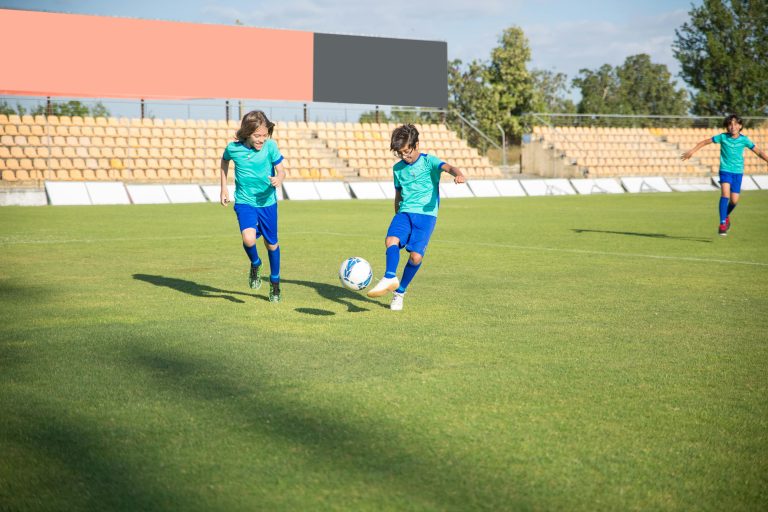There’s something about football that gets into a kid’s bones. Maybe it’s the thrill of running a perfect play, or the quiet pride of standing on a field knowing your team has your back. Whatever it is, football has a way of shaping young people from the inside out. It’s not just about touchdowns and trophies. It’s about learning how to show up for others, handle pressure, and grow into someone who doesn’t quit when things get tough.
The Game That Teaches Grit
When kids first strap on their cleats and step onto that green field, they’re not just playing a sport. They’re stepping into one of life’s best classrooms. Football demands persistence. You can’t fake hustle, and you can’t hide from hard work. Every play is a test of effort, and the smallest victories can feel enormous. Whether your child is a natural athlete or still figuring out which shoe goes on which foot, the game teaches grit through repetition, teamwork, and accountability.
Football helps kids learn how to fail without falling apart. They drop passes, miss tackles, and lose games. Then they wake up the next day and try again. That lesson carries far beyond the field. When they face challenges at school or in friendships, they already know how to recover and push through. It’s a kind of mental muscle they’ll use for the rest of their lives.
Finding Confidence Through Teamwork
For a lot of kids, football becomes the first time they realize that confidence isn’t something you’re born with, it’s something you build. Every game offers proof that their effort matters. A good block can open up a path for someone else to score. A steady hand can turn a near miss into a win. Those little moments pile up, and suddenly, a shy or hesitant kid starts standing taller.
Confidence in football doesn’t come from ego. It comes from belonging. Knowing that you’ve earned your place in a group of people who rely on you does something powerful to a child’s self-image. They stop seeing themselves as just individuals and start seeing themselves as teammates, contributors, and problem-solvers.
Even small details, like wearing turf tape on their arms before a big game, can spark a sense of identity and pride. It’s not about looking tough, it’s about feeling prepared. Those rituals, from pre-game stretches to shared chants, help kids settle into their own version of confidence without needing to compare themselves to others.
Family Ties On And Off The Field
For parents, football can turn into an unexpected family tradition. From the first Saturday morning scrimmage to late-season playoffs, it becomes a rhythm everyone looks forward to. The sidelines fill with cheers, thermoses of coffee, and laughter. That sense of community isn’t limited to the field, either. Families bond over shared routines, pre-game breakfasts, and post-game debriefs in the car.
Football also gives parents a chance to model how to handle both victory and defeat with grace. When kids see their parents cheering regardless of the scoreboard, it reinforces that effort matters more than outcome. Those lessons shape character as much as any drill ever could.
And for younger siblings watching from the stands, the excitement is contagious. They see their big brother or sister out there giving their all, and they start to dream about their own turn. Football naturally brings families closer, giving everyone a common thread that runs through the season and often, the years beyond.
Creativity And Fun Beyond The Field
Football culture has a way of spilling into everyday life, and that’s where things get especially fun. Kids love making football-themed crafts, like decorating mini goalposts out of cardboard or designing their own team pennants for game day. These activities keep the spirit of the sport alive between practices, while encouraging creativity and teamwork in a different setting.
For parents, these moments are gold. They turn competition into connection. Whether it’s painting signs for the big game or baking football-shaped cookies, kids learn that sports can be about joy, imagination, and community, not just performance. It helps balance out the intensity of the sport with something lighthearted, grounding the whole experience in family and fun.
The Bigger Lessons That Last
The benefits of football reach far beyond physical fitness or athletic skill. Kids learn strategy, timing, and how to think three moves ahead. They also learn humility, because every player knows what it feels like to rely on someone else and to be relied upon in return. They pick up patience when they sit on the bench and perspective when they’re reminded that being a good teammate matters more than being the best player.
These are the qualities that translate to adulthood. They’re what make someone a dependable friend, a focused student, or a future leader. Even if your child doesn’t go on to play in high school or beyond, the mindset they develop will serve them in whatever they choose to do. Football teaches that progress is rarely easy but always possible. That’s a lesson kids won’t forget.
In the end, football gives kids something that’s increasingly rare: a structured way to struggle, learn, and succeed together. It’s a sport that turns effort into confidence and teamwork into purpose. Getting your kids into football isn’t just about exercise or competition. It’s about giving them a place to grow up with grit, gratitude, and a strong sense of who they are when they stand on that field.









